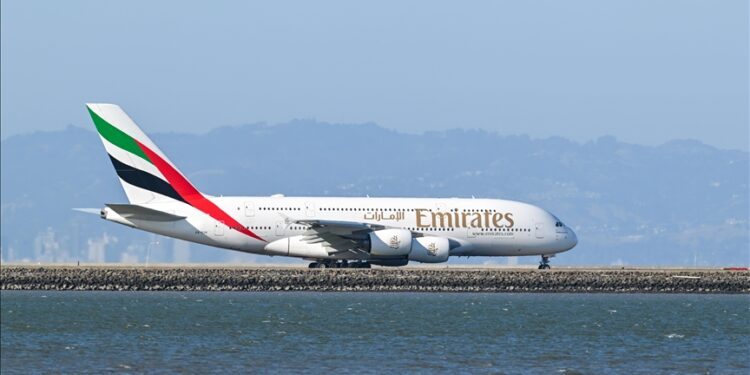ANKARA
Long-haul carrier Emirates is gearing up for an ambitious 2025, with plans to expand its global network, introduce state-of-the-art aircraft, and lead the way in sustainability after a stellar performance last year.
With robust passenger and cargo demand and innovative strategies, the Dubai-based carrier is building on record-breaking momentum to redefine the future of aviation, Emirates’ country manager for Türkiye, Bulgaria, and Romania told Anadolu.
Emirates hit a record revenue of 62.2 billion Emirati dirhams ($16.9 billion) for the first half of the 2024-25 fiscal year, a 5% increase from a year ago, thanks to strong travel demand, the rollout of retrofitted aircraft and the resumption of key routes.
“While we faced challenges such as volatile fuel prices and geopolitical tensions, our adaptability ensured we not only met but exceeded our targets,” Mehmet Gurkaynak said.
He added that the airline’s commitment to customer service played a pivotal role in maintaining its leadership position in the global aviation industry.
Key highlights of 2024 included the launch of new routes such as Bogotá via Miami and Madagascar via Seychelles, as well as the resumption of daily service to Phnom Penh.
Emirates also rolled out fully refreshed interiors for eight aircraft as part of a $4 billion retrofit program, introducing its latest inflight experiences on over 30 routes.
Highlighting that Emirates aims to continue expanding its global reach, Gurkaynak noted that the airline plans to introduce its new Airbus A350-900 aircraft, which will unlock opportunities to serve mid-sized airports and long-haul destinations.
The A350 is expected to debut on routes to Bahrain, Muscat, Lyon, Colombo and Mumbai, with additional destinations, up to 15 hours from Dubai, to be announced in the coming months.
By the end of 2025, Emirates aims to have 10 A350s in service across nine destinations, he said.
Emirates is also deepening partnerships to enhance connectivity, he highlighted as recent agreements with AirPeace, Avianca and SNCF Railway exemplify the airline’s commitment to providing seamless travel experiences.
“Our strategy revolves around innovation, excellence, and sustainability,” he said, adding that Emirates’ growing network and strengthened partnerships ensure that it remains “the airline of choice for millions worldwide.”
Emirates will also expand its Premium Economy class, following its resounding success, and continue the rollout of its refurbished Boeing 777s to key US routes, including Chicago, Seattle, and Miami.
As the aviation industry intensifies its focus on sustainability, Emirates is leading the charge with significant investments in reducing emissions and adopting sustainable aviation fuels (SAF), Gurkaynak told Anadolu.
In 2024, the airline uplifted SAF for the first time in Singapore, London Heathrow, and Amsterdam, and joined the Aviation Initiative for Renewable Energy (aireg) in Germany.
“Sustainability is a key priority for Emirates,” Gurkaynak said, noting that Emirates recently disbursed its first funds from a $200 million initiative to support research and development in sustainability solutions.
The airline is also implementing the International Air Transport Association Environmental Assessment (IEnvA) system to manage environmental effects across operations and continues to optimize flight routes and invest in fuel-efficient aircraft.
Innovation remains central to Emirates’ strategy for growth and customer satisfaction. In 2024, it expanded its use of biometric technology for seamless boarding and check-in and advanced its inflight entertainment system, “Ice,” to offer faster connectivity and personalized content.
In 2025, Emirates plans to enhance its digital capabilities while rolling out immersive training platforms for its crew. The airline is also leveraging advanced flight planning systems to optimize routes and reduce fuel consumption, ensuring operational efficiency.
– Overcoming challenges at Dubai Airport
As the Dubai International Airport (DXB) continues to handle increasing passenger volumes, Emirates is addressing capacity challenges through close collaboration with Dubai airports.
Investments in infrastructure and technology, including advanced baggage handling systems and real-time data sharing, are ensuring seamless operations, he said.
Looking to the future, the upcoming Al Maktoum International Airport (DWC), set to launch in 2035, will play a critical role in alleviating congestion at DXB, Gurkaynak stressed.
With a capacity to handle up to 260 million passengers annually, DWC is projected to cement Dubai’s status as a global aviation hub, he stated.
– 2024 springboard for 2025 success
Reflecting on the successes of 2024, Gurkaynak highlighted Emirates’ ability to adapt to a rapidly evolving industry.
The airline responded to surging passenger demand by resuming key routes, increasing frequencies and deploying larger aircraft, he noted.
Despite challenges such as volatile fuel prices, Emirates maintained profitability and invested in areas like sustainability and customer experience.
Stressing that Emirates’ record-breaking performance in 2024 has laid the foundation for a more ambitious 2025, Gurkaynak said the carrier wants to connect more people and places while setting new benchmarks in sustainability and innovation.






